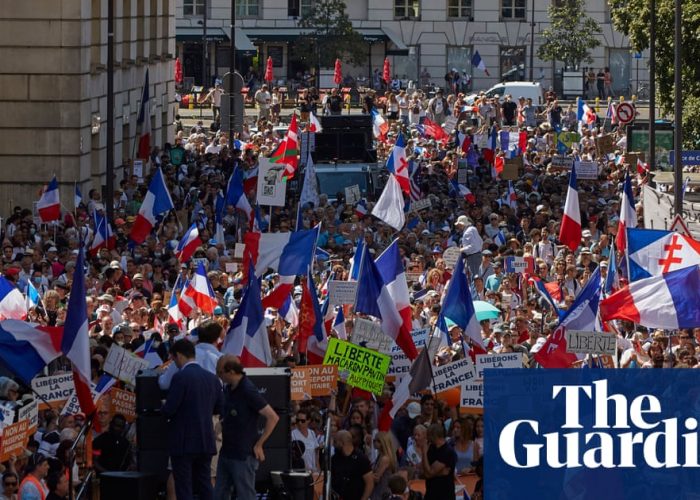French prosecutors have launched hate speech and incitement of violence investigations into antisemitic banners seen at demonstrations against the countrys coronavirus health pass, which is now required for many daily activities.
Recent anti-health-passdemonstrations have seen protesters brandishing placards featuring syringes forming swastikas, wearing yellow stars or carrying banners bearing the word Qui? (who?), which has emerged as the latest antisemitic slogan of the far right and conspiracy theorists.
After the fourth Saturday of demonstrations in Paris, the citys public prosecutor said the police were looking at whether some banner-wavers were provoking public hate or violence against a group of people because of their origin, their belonging or not belonging to a particular ethnic group, a nation, a race or a religion.
Last week, Cassandre Fristot, a teacher and former far-right Front National official, was put under investigationafter carrying a cardboard placard during an anti-pass march in the eastern town of Metz.
On it was written mais qui followed by names of well-known French and international Jewish people and their supposed supporters. The education authorities have suspended Fristot from her job. She will appear in court in September accused of provoking racial hate. If convicted she faces a one-year jail sentence and a fine of up to 45,000 (£38,000).
Supporters of Frances anti-health-pass movement claim the measure, which requires people to show they have been fully vaccinated, tested negative for Covid or recovered from the virus before they can access many health services and enjoy everyday activities, is a threat to personal and civil liberties.
The movement has drawn support from the far right and left of the countrys political spectrum as well as Gilets Jaunes (Yellow Vests), other opposition groups and an array of conspiracy theorists.
The placards under investigation, however, suggest the protests have become entwined with a new wave of antisemitism in France, where there have been multiple reports of vandalism and graffiti bearing Nazi symbols and Qui? on buildings, monuments, churches and vaccine centres in recent weeks.
In the Brittany seaside town of Perros-Guirec known as the city of hydrangeas locals woke up recently to a depressing sense of déjà vu when, for the fourth time in two weeks, a local memorial to Simone Veil, Holocaust survivor, lawyer, politician, feminist and abortion campaigner, had been vandalised. Once again, the graffiti included swastikas.
For Robert Ejnes, executive director of the Conseil Représentatif des Institutions Juives de France (Council Representing Jewish Institutions in France CRIF), said this latest wave of antisemitism was like the vandalism in Perros-Guirec depressingly familiar.
It is worrying not just for Jewish people but for the whole of French society because antisemitism is just the beginning of a process that leads to the expression of hate for the other, Ejnes said.
These people are using all the antisemitic prejudices from the worst hours of the history of France and Europe, so of course this worries us, Ejnes added.
In France, Qui? spread after a June television interview with retired army general Dominique Delawarde who suggested certain groups were controlling the media pack. Pressed to say who he was referring to, Delawarde responded to the question mais qui? (but who?) by saying, that well known community.
Delawarde was one of the signatories of a controversial letter published in April this year, warning of the disintegration of France and evoking what it called the perils of Islamic extremists and the hordes from Frances banlieues, the poor and run-down city suburbs, particularly those outside Paris. The letter also accused anti-racism groups of creating hatred between communities and cautioned that lax government policies could spark chaos requiring military action to protect our civilisational values.
A poll by Ifop for the Journal du Dimanche on Sunday found 73% of French people asked said they considered antisemitic placards and social media posts from those opposed to the health pass shocking and incitement to hate. This dropped to 53% of those who professed support or sympathy for the anti-pass movement.
What is increasingly worrying is [antisemitism] is considered increasingly normal, increasingly banal, in French society. We are seeing people openly expressing it and claiming it is freedom of speech, Ejnes said. He also criticised those who portray the French president, Emmanuel Macron, as Hitler and wear yellow stars to show their opposition to the health pass.
To compare symbols of the exclusion of people who were rounded up, deported and killed, to a health pass aimed at protecting people and protecting others we have enormous intellectual difficulty understanding this, he said.
On Sunday, around 100 Perros-Guirec residents gathered to commemorate Veil and condemn the vandals.
Veil, born in 1917, was deported to Auschwitz as a teenager and lost her mother, father and brother in the death camps. She survived the Holocaust to become a celebrated figure in French and European politics, fighting for abortion rights, battling antisemitism and also serving as the first president of the directly elected European parliament in 1979 as well as the first woman to hold the post.
Perros-Guirec pastor Pierre Kerlévéo described the attacks on the memorial as intolerable. Liliane, a local woman who placed a rose at the memorial, told Ouest France: To attack the memory of this great lady, who did so much for women and who suffered so many atrocities during the war, is shocking and odious. Hence the importance of showing our refusal of such gestures.
Macron also condemned the desecration of the memorial. We will never tolerate antisemitism, he tweeted. For Simone Veil, whose memorial was desecrated, I want to repeat to everyone: France will not back down.read more
Hate speech inquiries launched in France over antisemitic protest banners


